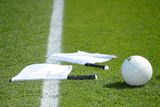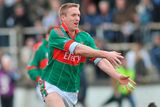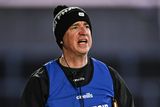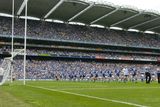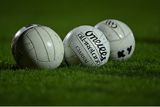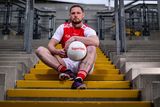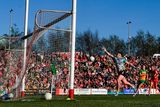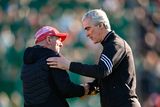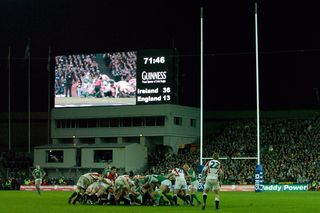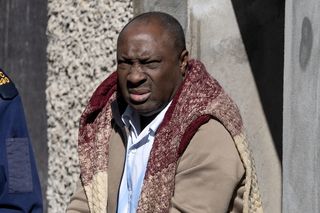Mayo on a plateau or set for highest peaks?
Lee Keegan
What, if anything, is different about Mayo this year? It's all that matters in a county that has become the capital of frustration, because unless there's an improvement on previous seasons, stark reality dictates that the 64-year All-Ireland drought will continue.
Why should it be otherwise? If Mayo weren't good enough over the past three seasons, there's no logical reason to believe that a return to those levels would yield anything other than further misery.
In fact, it may take a substantial improvement to beat Dublin and Kerry, the long-time All-Ireland favourites.
Still, Mayo have answered every call quite comfortably so far this summer, but are now facing a massive step-up in class.
So too are Dublin, whose path to the semi-final is best described as smooth, having encountered four counties which finished between 15th and 26th in the Allianz League.
Of course, Dublin won the 2011 and 2013 All-Ireland titles so their stock is, quite correctly, rated higher than a Mayo squad that has repeatedly come up short.
From a Mayo perspective, it's all about whether they have advanced sufficiently to break through the barriers that prevented them entering the promised land in 2012/'13/'14.
So what are the changes in the Mayo set-up this year?
And will they bring about the improvement required to persuade Sam Maguire that it's time to winter way out west?
Management: New brooms
The concept is unusual as Pat Holmes and Noel Connelly are joint-managers, who insist they work together so well that there's never an issue about making a big call during a game.
But then, they were partners as U21 joint-managers from 2006 to 2009, during which Mayo won an All-Ireland and four successive Connacht titles. This is Holmes' second coming, having managed the senior team for three seasons (2000-2002), during which Mayo won the League in 2001.
However, they failed to win a Connacht title in that period. Holmes, who was aged 33 and only just out of his playing days, admitted after his latest appointment last autumn that it was probably a mistake to go into management so soon in late 1999.
Connelly, captain in the 1996 and 1997 All-Ireland finals when Mayo lost to Meath (replay) and Kerry, knows what it takes at the top level too.
An area of concern for the new management is that they have not found even one brand-new talent good enough to force his way into the team. Nor is there much change in the subs, which suggests that once Holmes and Connelly delved beneath the top layer, there were no previously undiscovered nuggets in the next seam.
Goalkeeper: Spoilt for choice
David Clarke (31), who made his championship debut in 2005, returned this season in place of Robert Hennelly (25). They have fought an intense battle for the No.1 jersey since 2011, with Kenneth O'Malley (28) also challenging. Hennelly replaced the injured Clarke after the Connacht semi-final in 2013 and played in the remaining four games.
Hennelly played in all of Mayo's championship games last year and came very close to snatching the winning point in the closing seconds of the replayed All-Ireland semi-final, only to see his long-range effort from a free drop short, sending the game into extra-time, where Kerry won.
Clarke has been beaten four times in three games in this year's championship, twice each against Galway and Sligo, while Donegal drew a blank. He injured an adductor muscle against Donegal and was replaced by Hennelly but has regained full fitness and returns for tomorrow.
Defence: Familiar faces
In terms of personnel, it's an area of little change for four seasons. That has to be a concern for Mayo, since all sectors of a team requires refreshing, especially when the big prize hasn't been won.
Colm Boyle for Kevin Keane is the only change in personnel from the defence that started against Dublin and Donegal in the All-Ireland semi-final and final respectively three years ago. Keith Higgins for Tom Cunniffe is the only change from the defence that started the 2013 All-Ireland final against Dublin. Higgins played in attack two years ago but has since returned to defence.
Cunniffe started against Galway, Sligo and Donegal, but went off injured in the last game, replaced by Chris Barrett who starts tomorrow.
The defence conceded an average of 1-11 in their three games so far, but are facing a much tougher challenge tomorrow. Strong attacking runs have been a profitable feature of the Mayo defenders' game in terms of score-getting but there were times when it backfired too, leaving gaps for the opposition to exploit if the movement broke down.
Mayo's attack-minded defenders have been more judicious about their runs this year, although Lee Keegan still got forward often enough to be the side's third highest scorer on 2-2.
Playing Barry Moran as a protector in front of the full-back line worked well against Donegal but Dublin play a different type of game so it might not be as effective if repeated tomorrow.
Midfield: Back to the future
Tom Parsons' return as Seamus O'Shea's partner has been a positive development. The clash with Galway in June was his first championship start since Mayo lost to Sligo in 2010.
That was the final season of John O'Mahony's second coming as Mayo manager and when new boss James Horan named his panel for the 2011 championship, there was no place for Parsons.
A combination of work commitments overseas and niggling injuries also combined to squeeze Parsons out of the inter-county loop until last year when he returned to the panel.
Parsons looked a brilliant prospect when he broke into the Mayo senior team at the age of 20 in 2008, a year in which Seán Boylan selected him on the Irish International Rules team for the tour to Australia.
However, various circumstances conspired against him but he has got another big chance this season. A big, athletic performer, the Charlestown man has played very well so far and is now regarded as a significant addition to Mayo as they move to the next level.
Attack: Wrecking-ball time
Playing Aidan O'Shea close to the opposition goal is Mayo's big attacking idea this year. It has worked well so far, although it should be remembered that neither Galway nor Sligo would be ranked among the top security experts. Donegal are, but they looked a tired outfit in the quarter-final, just as they did when Mayo ripped them apart at the same stage two years ago.
Dublin will have parsed and analysed every detail of Aidan O'Shea's game, plus the means of supply, so he can expect a much tougher afternoon than anything he has experienced so far.
Mayo insist that there's a whole lot more to their attacking strategy than scudding high ball in O'Shea's direction but they can't deny that it was a central plank in all three championship games to date.
They need more than that to unsettle Dublin, who will attempt to landmine the approach routes towards O'Shea. The rest of the Mayo attackers must be able to generate their own momentum if he finds himself entangled in a blue web.
With Barry Moran likely to have duties further back, that further adds to the workload on the other Mayo forwards, where the only newcomer from the last clash with Dublin two years ago is Diarmuid O'Connor.
He won an All-Ireland medal as a midfielder in the curtain-raiser to the 2013 Mayo-Dublin senior final. Now he is seen as bringing a fresh, exciting new dimension to an attack which has been regarded as largely one dimensional.
That's somewhat at variance with reality since they scored enough (1-16 and 3-11 in normal time) against Kerry last year to win most games.
And their 1-14 in the 2013 final against Dublin came up only one point short of forcing a replay.
O'Connor made his senior debut in last year's championship and played in all three games this year so the 20-year-old Ballintubber man is ready for this big step up, alongside his brother Cillian, who is Mayo's top scorer, Kevin McLoughlin and Jason Doherty.
